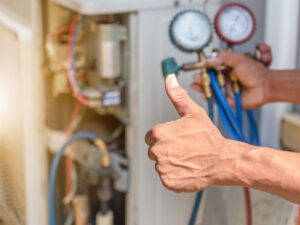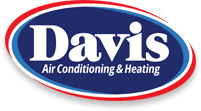An Easy Guide to MERV Ratings for Your AC Filter
When selecting an air conditioner, there are many frequently asked questions, at least two of which relate to filtration. The first might be what kind of filter is needed. Whether or not that question comes to mind, the other likely question is what does the MERV rating mean that is on filter and what does it do.
What is MERV?
In the simplest terms, MERV measures how much matter passes through an air filter. MERV stands for Minimum Efficiency Reporting Value. MERV ratings are on a scale of one to 20 depending on the minimum size of the particles a filter can be expected to capture:
- A filter with a MERV rating of one to four captures particles greater than 10 micrometers. This includes bugs, dust mites, and household debris. Most window air conditioners fall within this range.
- A filter with a MERV rating of five to eight captures particles greater than three micrometers. This includes mold, pet dander, and aerosol sprays. This is the baseline for permanently installed residential air conditioners.
- A filter with a MERV rating of nine to 12 captures particles greater than one micrometer. This includes most dust and common pollutants. Hospital laboratories and superior residential air conditioners fall within this range.
- A filter with a MERV rating of 13 to 16 captures particles greater than 0.3 micrometers. This includes bacteria, droplets from sneezing, smoke, and most other sources of pollution. This level of filtration is used in patient and surgery areas of hospitals.
- A filter with a MERV rating of 17 to 20 captures virtually all particles. This includes viruses and the finest particles of smoke, dust, and other debris. This level of filtration is typically only used in clean rooms for the manufacture of electronics or scientific experiments.
What Level of Filtration is Needed?
As seen above, for a permanently installed residential air conditioner, the range is between five and twelve, which can seem rather large. In actuality, HVAC experts often state that there is generally little noticeable difference once the MERV rating is greater than seven.
One factor that may change this is allergies or other health concerns. In that case, a filter capable of removing allergens would be desired and an HVAC expert should be consulted to determine the appropriate level of filtration to help allergies and be appropriate for your system.
Modern construction may also create a need for increased filtration. This is because
better insulation and airtight construction reduces air circulation. Although this decreases leaks and therefore utility bills, it also means that fresh outdoor air is not coming into the home and indoor pollutants from cooking, cleaning, and other causes can build up. The air conditioner filter may be the home’s only filtration or ventilation system and in that case, a higher rated filter will probably be desired.
You May Also Like

Is My Heat Pump in Fort Bend, TX, Low On Refrigerant?
Your heat pump hums through the cool January mornings in Fort Bend, TX, but something feels off. The air trickling from your… Continue Reading Is My Heat Pump in Fort Bend, TX, Low On Refrigerant?…

How Often Should I Change My HVAC Filter in Pasadena, TX?
The crisp winter air sweeping across Galveston Bay might feel refreshing outdoors, but inside your Pasadena, TX, home, your HVAC system works… Continue Reading How Often Should I Change My HVAC Filter in Pasadena, TX?…

Should I Repair or Replace My Furnace in Houston, TX?
The mercury’s dropped, your furnace is making strange sounds, and you’re wondering whether to nurse it back to health or send it… Continue Reading Should I Repair or Replace My Furnace in Houston, TX?…
